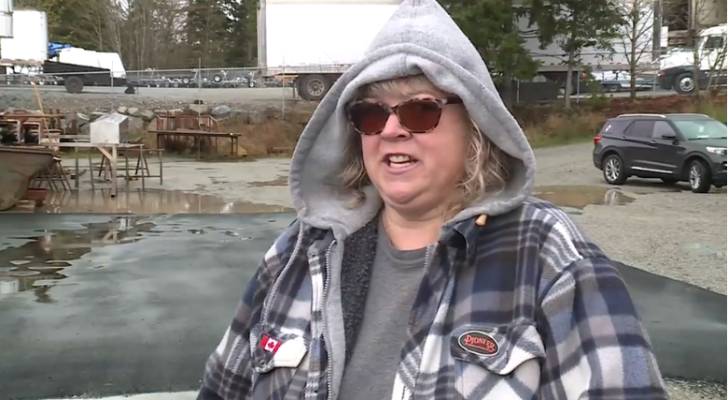
Tracy Bekker, a Canadian business owner in Port Alberni on Vancouver Island, British Columbia, almost got scammed out of $28,000 until she told reporters that her “animal instinct” kicked in.
In late March, Bekker says she was approached by someone who worked at a paving company, who offered her a discounted price to pave her gravel lot, since he claimed he had asphalt they had left over from a previous job.
Don’t miss
- I’m 49 years old and have nothing saved for retirement — what should I do? Don’t panic. Here are 5 of the easiest ways you can catch up (and fast)
- Gain potential quarterly income through this $1B private real estate fund — even if you’re not a millionaire. Here’s how to get started with as little as $10
- Thanks to Jeff Bezos, you can now become a landlord for as little as $100 — and no, you don’t have to deal with tenants or fix freezers. Here’s how
The initial quote: $9 per square foot.
Bekker told CHEK News that a lot of the asphalt is already falling apart, and in places, not as thick as what the person at the paving company claimed it would be.
The man at the paving company also kept pressuring her to increase the square footage of the job, which Bekker says was probably their way of getting more money.
When she realized what was happening, she refused to pay.
“I said, ‘Go ahead, we’re not paying for it anyway,’” when the workers threatened to put a lien on Bekker’s business and pull up all of the asphalt.
The exchange escalated so much that Bekker called 911 and told them that some people were trying to scam her.
“The next thing I know is they took off so fast,” she said.
How did the paving company owner respond?
The team who approached her were from Pro Style Paving, but when CHEK News reached out to the owner, Ben Ashurst, he let them know he’d been completely in the dark on the issue.
Ashurst says when looking through his books, he found orders for a number of material and side jobs that he’d never authorized. He blamed an unsupervised crew for the scheme and fired two team leaders presumably involved.
“They’ve basically been pocketing money for themselves,” he said.
Ashurst has since told Bekker she doesn’t need to pay him anything. When CHEK News reporters asked if he’d admit that his crew had been scamming people, he replied that he couldn’t admit to anything because he didn’t know what the crew had been doing.
Read more: Car insurance premiums could spike 8% by the end of 2025 — thanks to tariffs on car imports and auto parts from Canada and Mexico. But here’s how 2 minutes can save you hundreds of dollars right now
Watching out for these scams
Sadly, these types of scams are more common than you think.
So much so that the Better Business Bureau (BBB) has an entire section called “BBB Scams HQ” devoted to informing consumers and businesses about them.
Paving scams specifically have become popular enough that the BBB posted a scam alert last June, warning consumers of the shady tactics they may encounter. It starts out much like what Bekker experienced.
How it usually works is a contractor will show up at your door to ask if you need any work done on your driveway or sidewalk since they’re in the area. They claim they have extra supplies after completing a nearby job and offer you a discount.
The scammer will usually dodge any questions you have and attempt to get you to pay a large deposit upfront.
A few scenarios could happen after you pay them. One, the contractor will disappear and you can’t contact them. Or, they may complete the work, but it’s not good quality work. If you refuse to pay, the contractor may try to threaten a lawsuit or other similar tactics to get you to pay up.
It’s also common for these scammers to impersonate a legitimate company.
How to avoid getting scammed
Scammers aren’t going to go away, so your best line of defense is to try and avoid being scammed in the first place.
Be suspicious of any offer if someone approaches you with a similar “deal.” Always get the person’s name and see if they have proper identification.
Scammers will try to pressure you to accept their offer, but slow down and reach out to the company they’re supposedly working for before you make a decision. Consider looking them up on the BBB website, as legitimate ones tend to have an accredited listing.
Before getting any work done, have the estimate and a detailed overview of the home improvement project in writing. You want to be sure you have a contract in place outlining the payment amount, start and completion dates, and a breakdown of the costs (including service and materials).
If you believe you’re a victim of a scam or being targeted for one, be sure to report it to the BBB Scam Tracker and the Federal Trade Commission.
What to read next
- Want an extra $1,300,000 when you retire? Dave Ramsey says this 7-step plan ‘works every single time’ to kill debt, get rich in America — and that ‘anyone’ can do it
- Here are 5 ‘must have’ items that Americans (almost) always overpay for — and very quickly regret. How many are hurting you?
- ‘Liberation Day’ just triggered a 60% chance of a US recession, warns JP Morgan — use these ‘anti-shock’ money hacks to protect yourself ASAP
This article provides information only and should not be construed as advice. It is provided without warranty of any kind.